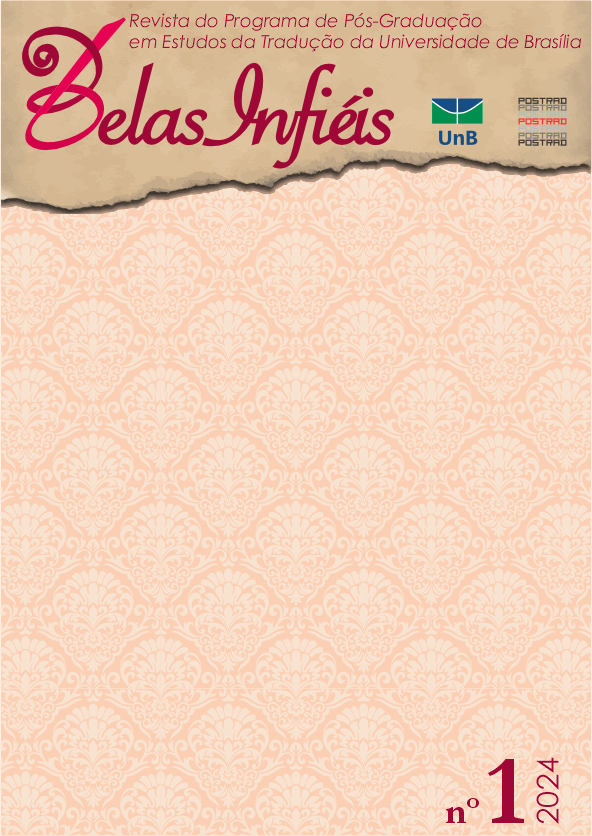Resenha de Narratives of Mistranslation, Fictional Translators in Latin American Literature, de Denise Kripper
DOI:
https://doi.org/10.26512/belasinfieis.v13.n1.2024.50390Palabras clave:
História da tradução. América Latina. Virada ficcional na literatura. Tradução Literária de Língua Espanhola.Resumen
Esta resenha apresenta o livro Narratives of Mistranslation, Fictional Translators in Latin American Literature, de Denise Kripper, publicado em 2023 na coleção Routledge Studies in Literary Translation. O estudo examina as influências da tradução, do texto e do processo na produção literária em países da América Latina. Por meio da análise de obras de ficção em que os autores também traduziam ou em que os personagens são tradutores, Kripper explora as dinâmicas envolvidas no processo de criação e recepção literária nos sistemas literários de língua espanhola nas chamadas “narrativas de tradutores”. Além disso, o livro discute a emergência da virada ficcional na literatura latino-americana, assim como abordagens pedagógicas em cursos de tradução que incluam narrativas de tradutores.
Referencias
Arrojo, R. (2018). Fictional Translators. Rethinking Translation Through Literature. Routledge.
Baer, B. J., & Kaindl, K. (Eds.). (2018). Queering Translation, Translating the Queer:
Theory, Practice, Activism. Routledge.
Chamberlain, L. (2000). Gender and the Metaphorics of Translation. In L. Venuti (Ed.), The Translation Studies Reader (1a ed., pp. 314–29). Routledge.
Delabastita, D., & Grutman, R. (Eds.). (2005). Linguistica Antverpiensia: Vol. 4. Fictionalising Translation and Multilingualism. https://lans-tts.uantwerpen.be/index.php/LANS-TTS/issue/view/9
Gentzler, E. (2008). Translation and Identity in the Americas. New Directions in Translation Theory. Routledge.
Kaindl, K., & Spitzl, K. (Eds.). (2014). Transfiction. Research into the Realities of Translation Fiction. John Benjamins Publishing Company.
Kripper, D. (2023). Narratives of Mistranslation. Fictional Translators in Latin American Literature. Routledge.
Lefevere, A. (1992). Translation, Rewriting and the Manipulation of Literary Fame. Routledge.
Pym, A. (2000). Negotiating the Frontier. Translators and Intercultures in Hispanic History. St. Jerome Publishing.
Simon, S. (1996). Gender in Translation: Cultural Identity and the Politics of
Transmission. Routledge.
Venuti, L. (2008) The Translator’s Invisibility. A History of Translation (2nd ed.). Routledge. (Obra original publicada em 1995).
Venuti, L. (Ed.). (1992). Rethinking Translation. Discourse, Subjectivity, Ideology. Routledge.
Vieira, E. R. P. (1995). (In)visibilidades na tradução: Troca de olhares teóricos e ficcionais. Com Textos, 6, 50–68.
von Flotow, L. (1991). Feminist Translation: Contexts, Practices and Theories. TTR: Traduction, Terminologie, Rédaction, 4(2), 6984.
Woodsworth, J. (Ed.). (2018). The Fictions of Translation. John Benjamins Publishing Company.
Descargas
Publicado
Número
Sección
Licencia
Derechos de autor 2024 CC BY

Esta obra está bajo una licencia internacional Creative Commons Atribución 4.0.
Copyright Statement
Given the public access to this journal, the texts are free to use but requires the recognition of the original authorship and initial publication in this journal to be properly stated.
The journal allows the use of works published for non-commercial purposes, including the right to submit the work to publicly accessible databases. Published contributions are the sole and exclusive responsibility of the author(s).
- When submitting papers to be evaluated by the Belas Infiéis journal, the author(s):
- Declare that the contents of the contributions are original and of their original creation, being entirely responsible for their content if there is an objection by third parties.
- Claim to be aware that they should not commit academic plagiarism.
- Declare that the manuscript has not been published, completely or partially, in Portuguese or another language. If it is a translation it should be submitted to the Translated Articles section.
- Declare that the manuscript is not being evaluated by other journals.
- Declare that the manuscript was not submitted to another journal simultaneously.
- Commit(s) to inform the journal of any kind of error or inaccuracy in their contribution (published, in evaluation or in editing) and to collaborate with the editors to make due corrections of the article (when in evaluation or editing) or erratum/retraction (after publication).
- Declare that there is no conflict of interest regarding the published work.
- Authorize its release if it is accepted for publication without any kind of monetary compensation.
- Agree to assign non-exclusive rights to publication to the magazine, remaining free to make their contribution available in other media as long as the publication of the first version in Belas Infiéis magazine is mentioned. They also authorize Belas Infiéis to assign their texts for reproduction in content indexers, virtual libraries and similar platforms.
- Maintain copyright and grant the journal the right of first publication, the work being licensed under theCreative Commons Attribution License.
- Is/Are allowed and encouraged to publish and distribute their work online after the editorial process, which may increase the impact and citation of the published work.
- Authorize the editorial team to make textual adjustments and to adapt the article to the publication rules, when necessary.



















